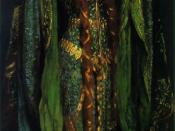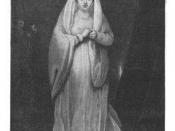Sleep is the transitional state between wakefulness and death and gives our body and mind a chance to maintain, repair and protect itself. Lady Macbeth's true personality is revealed during the sleepwalking scene. Her character follows the pattern of decline, despair and death. This pattern starts when she no longer had control over her husband, followed by hallucinations when she is sleepwalking and finally in suicide.
In the sleepwalking scene Lady Macbeth cannot bear to be without light, this is a contrast to the beginning of the play when she wanted to be surrounded by darkness. We see Lady Macbeth sleepwalking, washing her hands and talking to herself. She talks in a hesitant voice, madly going over and over the guilty details of her past. Early in the play, Lady Macbeth possessed a strong determination and sense of purpose than her husband and was the driving force behind her plot to kill Duncan.
When Macbeth believed his bloodstained hand would never disappear, Lady Macbeth told him, "A little water clears us of this deed". Macbeth says that "all great Neptune's ocean" cannot cleanse him and that there is enough blood on his hands to turn the entire sea red. This will stay with him until his death. By the end of the play, however, Lady Macbeth shares Macbeth's sense that Duncan's murder has permanently stained them with blood. She to cannot stop thinking about the blood, "Here's the smell of the blood still: all the perfumes of Arabia will not sweeten this little hand." Lady Macbeth is in her own private hell, which is a large contrast with her firmness and certainty at the time of Duncan's murder. Her inability to sleep was predicted in the voice that her husband thought he heard while killing the king - a...


